Note: this post was originally written for my blog[1], which may be why some parts might not appear to have been written for the Forum. I may publish a more anecdote-rich, freewheeling version there soon, in which case I'll make this a linkpost. It's there now, but virtually identical to this post.
Thanks to Martin Glusker for his detailed, very helpful thoughts and feedback.[2]
Intro
This post is my attempted contribution to the blogosphere’s “things I recommend you buy and use” micro-genre.
To give due credit to my intellectual forefathers: Sam Bowman's archetypal founding text, published in 2017, has since catalyzed iterations by Rob Wiblin, Michelle Hutchinson, Megan McArdle, Arden Koehler, Arden again, Julia Wise, James Aung, Rosie Campbell, Michelle Hutchinson, David Megans-Nicholas, Ben Schifman, Yuriy Akopov, Yuriy again, Sam himself again, and surely many others too in the five years since.
Edit: somehow missed Gavin Leech, Scott Alexander, Scott again, Mark Xu, Alexey Guzey, Jose Ricon, Phil Storry, this LW thread and another LW thread. Thanks to Gavin for the tip!
Those articles are generally cogent, succinct, easy to read, and well-organized. This one is not. While writing, some of my “recommendations” metastasized into needlessly elaborate product reviews or gratuitously heterodox hot takes. It's also a bit heavier on the dietary supplements than is typical.
So, without further ado, sit back and enjoy this hypertrophied smorgasbord of “product recommendations.”
Part 1: Non-consumables
2021 MacBook Pro
(An accidental mini-review)
- 14" model starts at $1,999.
- 16" model (which I have) starts at $2,499.
- Good condition used versions go for $100-$500 below retail on eBay, Craigslist, and Facebook Marketplace.
- After experiencing some buyer's remorse with the smaller 14" screen, I up selling this laptop and buying a used 16" version, each for ~$500 below retail.
- You can also spend up to
1 Trillion USD$6,599 for all the bells and whistles.
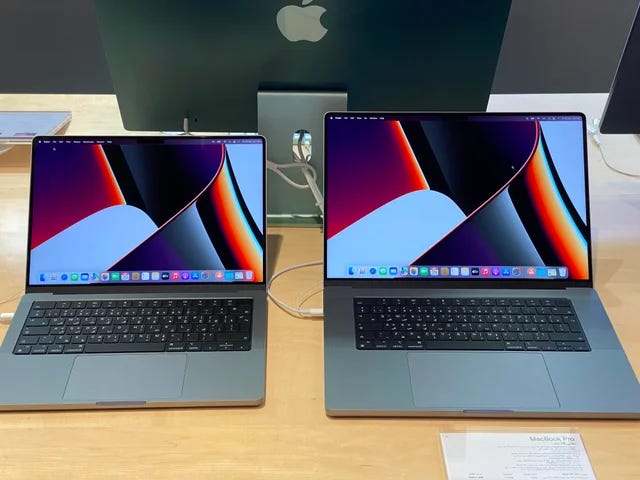
I know, an expensive device purchased by around 0.3% of all humans on Earth in 2021 isn’t really what the “stuff you should buy” micro-genre is all about.
Well that's too bad, because I really like this computer and three of its features in particular:
1) Bright screen
This is the feature I care about and appreciate most. Apparently some people are perfectly satisfied with dimmer screens. If that were me, I probably wouldn't have gotten this computer. All 2021 MacBook Pros reach 500 nits (brightness/surface area) for everything, and 1,000 or more for some content. For reference:
- Older Mac laptops max out at 400 nits (brightness/surface area), and I regularly wished my 2017 Air would get brighter.
- Most inexpensive (and some pricier) monitors reach 250.
- Most name-brand but less expensive models do even worse, like this HP at 220.
- New Dell laptops (e.g. this one for $1,449) can reach 500, but at this point you're not saving a huge amount of money compared to Apple.
Honestly, I’m not sure why Apple doesn’t make a bigger deal out of this; it’s arguably the only feature that matters every second you’re using the device and the new line of MacBooks are significantly brighter than almost every other make and model. To self-plagiarize some Tweets from a few months back:
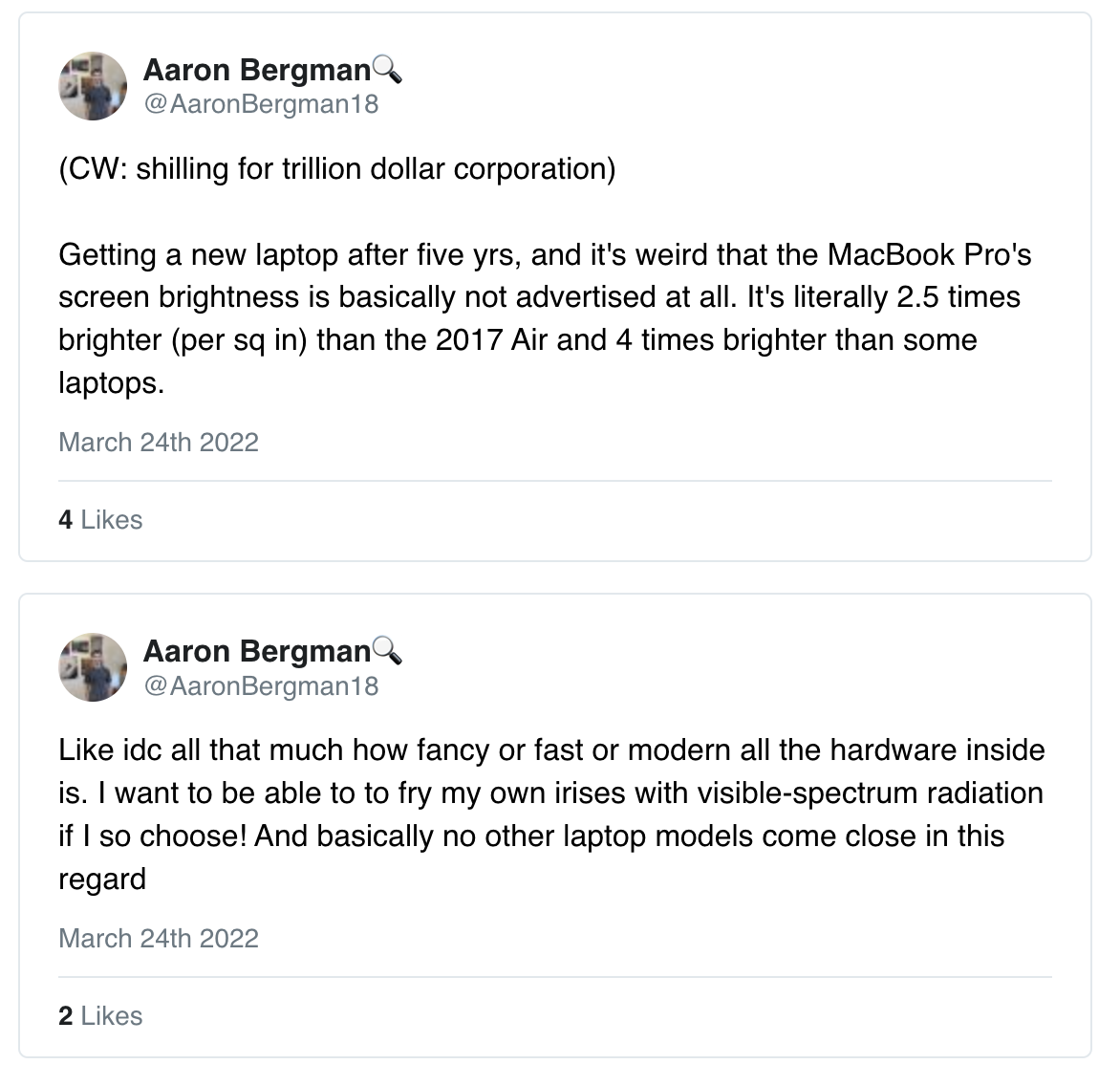
And ~95% of the time I keep the screen on full blast, churning electrons into a delightfully vociferous stream of electrons.
2) A ~luxurious~ amount of storage
For an additional $2,400, you can get a Pro with 8TB of storage, enough to contain God Himself hold many large files and applications.[3] But you can probably save your money for the other items on this list, because the base 512GB capacity is really quite a lot.
For reference, this was my storage summary after importing every file accumulated throughout high school and college and adding a bunch more:

3) Good battery life
In short, it’s nice to be be able to carry the thing around more or less all day without worrying about finding a charger or outlet or reducing the screen brightness by a single nit.
These are the numbers claimed by Apple

but they state plainly in a footnote that these figures were determined using pretty low screen brightness.
I can count on the 14’’ model for 5 hours of “complete” use (full brightness, using a bunch of apps, streaming music) at a bare minimum, and probably more like 7 or 8. This is almost always enough; I did run out of battery once (coming back from EAG London) because IcelandAir lied to me about their planes having in-seat power outlets.[4]
Bose QuietComfort 45 Headphones
- $329, but as of publication it’s on sale on Amazon for $279.

I regret to report that these headphones are indeed better than their more affordable counterparts, just as the Bose sales team would have you believe. The difference isn’t crazy—maybe 20% better sound quality, 25% better looking, 35% better noise canceling, and 40% more comfortable than the handful of other models I’ve tried (like these)—but that makes them worthwhile if you’re using them four or six hours a day.
The thing I’d emphasize is that, for me at least, comfort is more important and more neglected (not sure about tractability tho) than sound-quality or noise-canceling ability. As I gestured to above, more affordable alternatives are still pretty good at playing music and keeping out sound but are, by comparison, a bit more annoying to wear for long periods of time.
Kinda like the Macbook’s battery life, though, these don’t hit the “never think about it” threshold for comfort. Upon introspection, I still notice the tactile sensation of wearing them way more than for any article of clothing. If you know of headphones even comfier than these, please let me know!
Corn bulbs
- ~$18/bulb
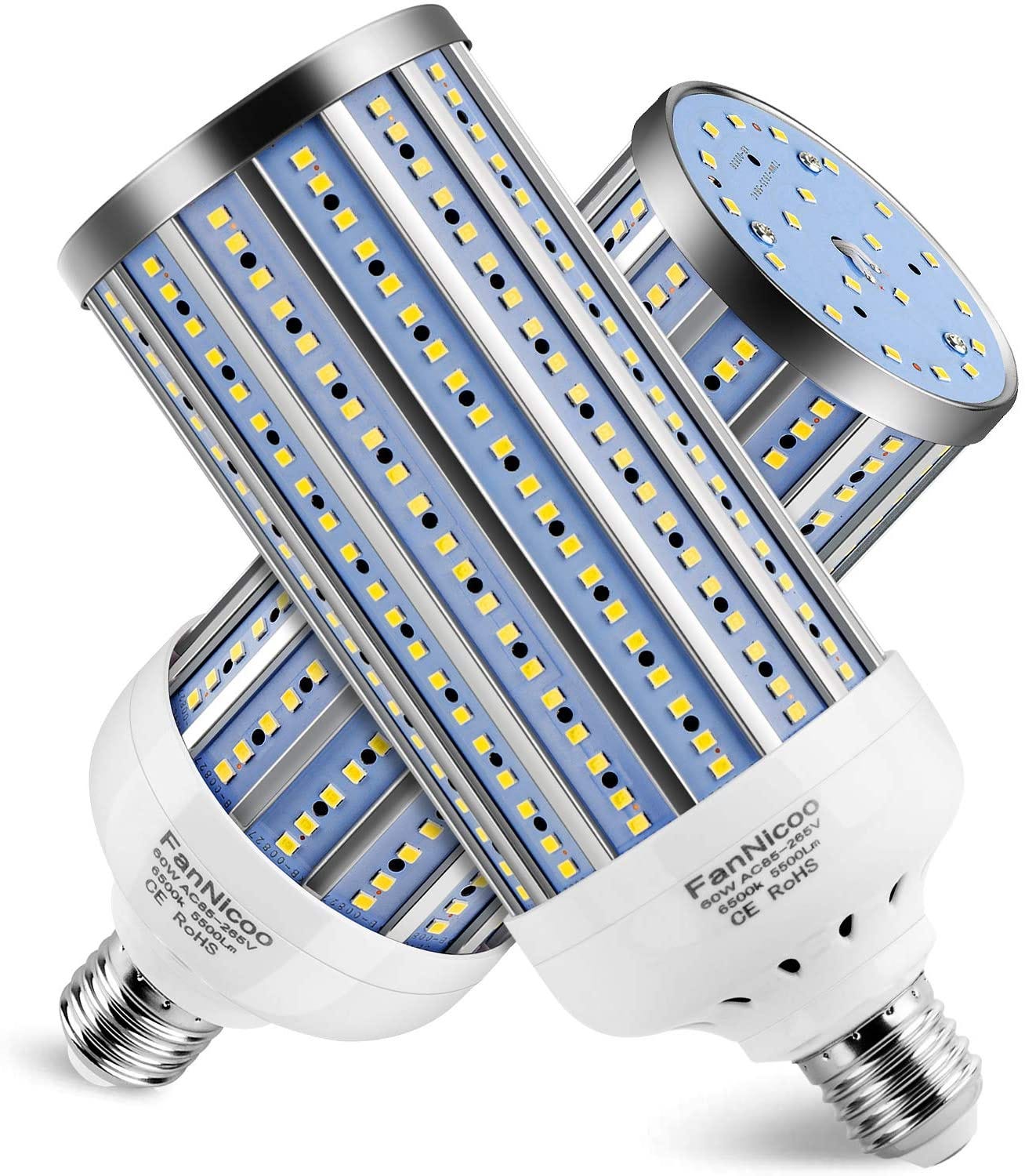
Most “regular” light bulbs run 600 to 1200 lumens (LM) in brightness. Some reach 1500LM, and a couple hit 2600. These “corn bulbs” manage 5500LM, and without using an abnormal amount of electricity or generating a noticeable amount of heat. In fact, they kinda hurt to look at without a lampshade, so don’t do that.

The one problem is that they’re too big to fit in some lamps (though they screw into any old normal socket).
You’ll see these mentioned in some “how to deal with SAD (Seasonal Affective Disorder)” blog posts, but you 100% do not need to have SAD to prefer bright lighting. If this seems relevant to you, check out posts like these.
Adjustable height desk
- I bought this one for $75 from some guy on Craigslist, but there are plenty on Amazon for around $200.

This is probably just a weird idiosyncrasy, but I find it annoying as hell when my chair’s armrests are too high to slide under the desk at which I’m working, which lets me sit really close to the desk’s edge. And most desks are way too short for this, which I’m guessing is a vestigial feature of the days when people wrote things by hand instead of typing. Anyway, highly recommended.
Bendy clip-on lamp
- $15

Why not just a normal lamp?
- Adjustable color, as shown in the picture above, is really nice for nighttime use
- Adjustable light intensity is also nice for night use
- Bendiness lets you direct the light at your face for video calls, at something in particular, or just off into the distance
- Clippiness will save you desk space
- Plugs into a usb outlet, so you can power it straight from a laptop.
- It's small, light, and portable enough to take on vacation or to the campus library if you’re as insensitive as me to social norms (don't worry, only in a private study room)
To Steal My Look, combine:
- Two of these (2 x 500LM )
- A normal overhead light (~1000 LM)
- Two corn bulb lamps (2 x 5500LM)
- One additional normal lamp (~700 LM)
for a grand total of 14,400 lumens, equivalent to around 9 of the brightest “normal” light bulbs you can find.
Mattress topper
- $25-$100 on Amazon.
- Not sure which brand I have, but it seems pretty basic.

After spending a night on a pile of leaves, in the rain, without a sleeping bag, pillow, or tent thanks to requirement 8 of the Wilderness Survival Merit Badge, I’ve decided to retire to a life of luxury.
Seriously though, it makes my bed at least twice as comfortable.
Part 2: Consumables and nutrition
Doctor’s Best Multivitamin
Product summary: There are good theoretical reasons not to think the null results from multivitamin RCTs apply to all products, for all end results, and to all people. Also most multivitamins are shit bad and this one isn't.
- $27 for months’ supply of 90 capsules
- I don’t take the full three capsules/day though
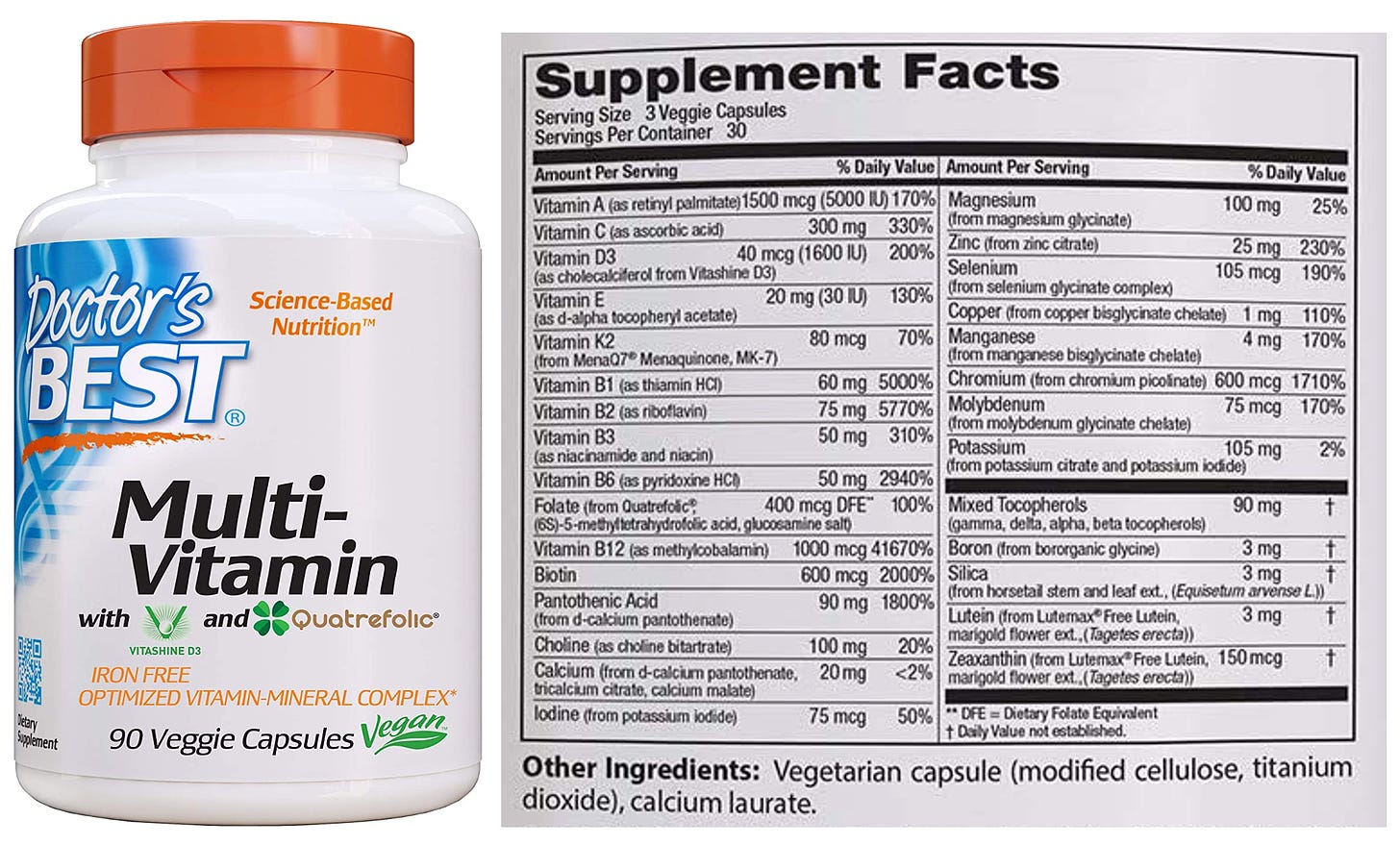
I know what you’re thinking:

As just one example, this Healthline article spells out the consensus expert opinion.
A few points in response
- Perhaps most importantly, most multivitamins are pretty bad. I elaborate on this below.
- Maybe that’s why all the top hits on Amazon refuse to show their actual “supplement facts” in the product description.
- I don't have any super-rigorous evidence for this. Rather, it seems like the majority are just checking the boxes of providing 100% of the FDA's RDA of like 10 or 20 nutrients without giving any attention to bioavailability, insufficiency rates, or other factors.
- Causal inference is really hard[5].
- Randomized controlled trials are one of the few types of study that can reliably produce knowledge as a standalone piece of evidence, and it looks like there are only a few RCTs of multivitamins (on a variety of health-related measures), and most or all are at least a decade old.
- Nutrition as a field (and to a lesser extent medicine and epidemiology more broadly) has a spotty track record, to say the least.
- We’re basically certain that micronutrient deficiencies can be bad for wellbeing in a number of ways. Scurvy is the trivial example.
- And would be very odd if you had to have a scurvy- (or rickets etc.) level of deficiency to be losing some degree of wellbeing. In other words, we should expect “mild deficiencies” or “insufficiencies” to be a thing.
- Modern western diets are pretty shitty and devoid of at least some important micronutrients.
- Deplin, which is FDA approved as an antidepressant adjunct, is just l-methylfolate.[6] This seems like proof of concept that micronutrient supplementation can have measurable emotional or cognitive effects even in well-nourished Western adults.
- For men in particular, there seems to be decent causal evidence that zinc and boron supplementation increase testosterone
- The hormone has a weirdly negative reputation, but if nothing else it seems to be somehow important for cognition.
- Prima facie, it seems like supplementing water-soluble vitamins (those besides A, D, and K) even at pretty high doses shouldn't be harmful because the body can easily get rid of extra.
- It's worth being more careful with doses for minerals and those three fat soluble vitamins.
A case study in poor quality
The first example I could easily find was Centrum’s general adult multivitamin. Here’s the nutrient label
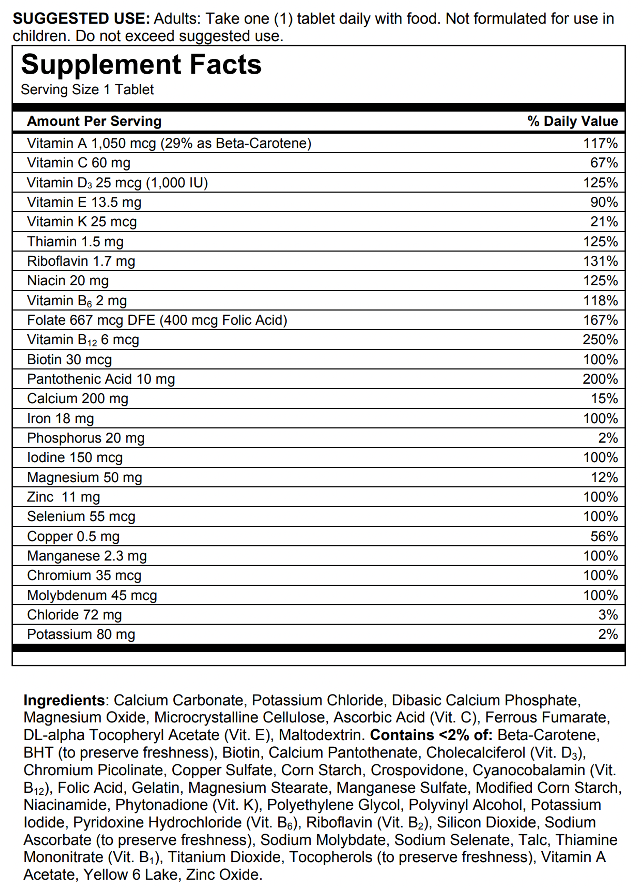
Diving into why this isn’t a great product could be a whole blog post on it’s own, but a few points to note:
- Dietary inadequacy rates varies a lot by nutrient.
- Basically everyone in the U.S. gets enough niacin, for example, but few of consume enough Vitamin K. Why, then would the Centrum supplement include just 21% of the RDA of the latter?
- Yes, Vitamin K toxicity is a thing that exists, but one standard serving of broccoli has 8x the amount included here, the drug they give people for Vitamin K deficiency has 200x the amount, and a human being literally would not be able to overdose with this product because they'd die from iodine poisoning (if not something else) first.
- And if you’re going to include minerals at all, why 12% of the magnesium RDA?
- Micronutrient absorption rates vary a lot by form (for some of them at least)
- Calcium carbonate? Not great. Magnesium oxide? May as well take an empty pill capsule; it virtually can’t be absorbed by the body. Vitamin A as beta carotene (the kind found in vegetables)? This one isn’t as clear, but arguably inferior to retinol (the kind found in animal products).
- And, as you can guess, the Centrum multivitamin contains these three inferior (and presumably cheaper) vitamin and mineral forms.
Anyway, I think there’s good reason to believe that a high quality multivitamin with bioavailable forms of vitamins and minerals that you suspect you might not get enough of from food and/or care particularly about is, in expectation, sufficiently beneficial enough to justify the financial cost and any associated risks.
To be honest, I settled on this particular product a while ago and don’t remember exactly why I did, but I stand by my choice. The doses make sense, the bioavailability is good, and it checks a few boxes I particularly care about.
Choline bitartrate
Product summary: Most people who don't eat eggs probably aren't eating enough choline for optimal cognition or general health. Also acetylcholine is really important, and dietary choline is its precursor.
- $20 for 100 day supply of ~50% of the RDA

Choline doesn’t often get discussed as a nutrient potentially worth supplementing. And that’s probably because most Westerners eat eggs and (to a lesser extent) red meat. Two eggs and a modest hamburger patty will get you ~320mg—or 58% of the 550mg (adult male) RDA—at a cost of ~350 calories. And, of course, most of us don’t need to consume need the full RDA to be basically fine.
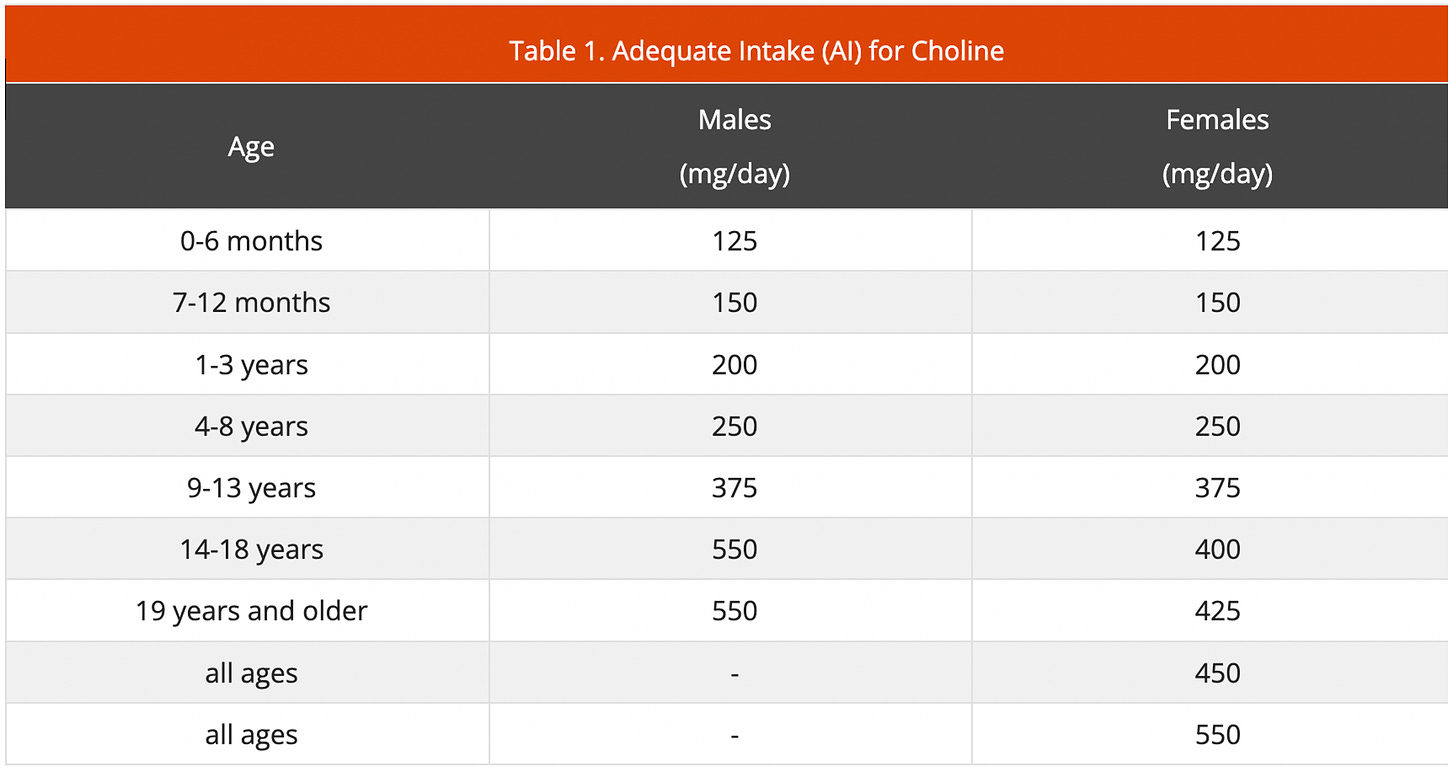
Cool. The only problem is that both I and (I bet) a good chunk of those reading this don’t or only rarely eat eggs for ethical reasons. Long story short, adults who eat neither eggs nor a whole lot of meat, or a shit ton of cruciferous veggies probably aren’t getting anywhere close to that semi-arbitrary-but-not-meaningless 550mg threshold.
But the second, more interesting half of the story is that choline is a direct precursor of acetylcholine, a neurotransmitter super important for focus, concentration, and memory. So it’s unsurprising that drugs that prevent the breakdown of acetylcholine seem to improve Alzheimer’s symptoms.
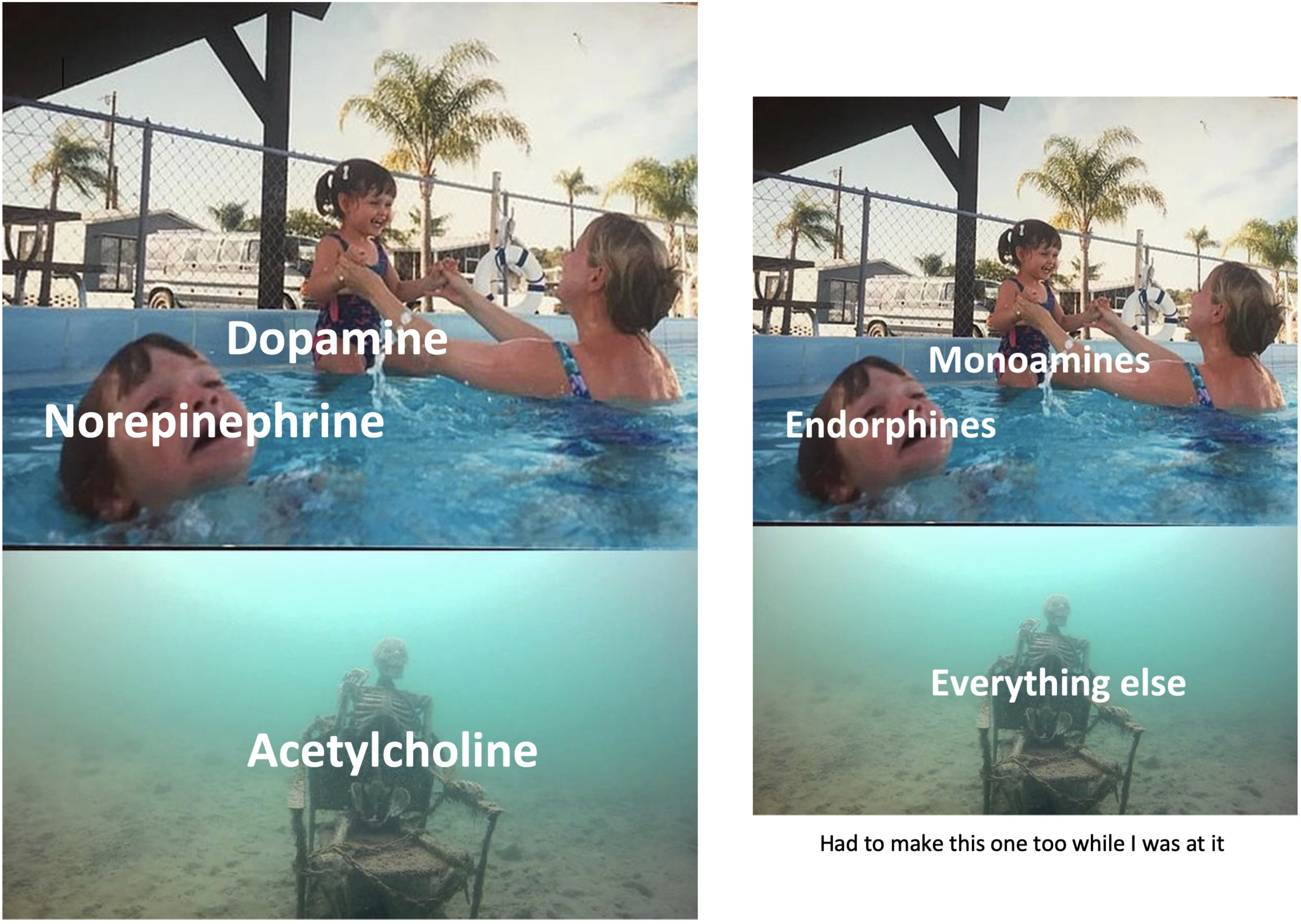
Putting it all together, I think there’s a pretty good chance that those who aren’t hitting, say, 2/3 of the choline RDA (~367mg for men, ~283mg for women) and value even marginal cognitive improvements should consider adding to their dietary intake.
Bonus unhinged speculation
As the term “nicotinic acetylcholine receptor” suggests, nicotine and acetylcholine activate the same receptor (yes, that ^ one) in the brain. It seems pretty clear that people with clinically low acetylcholine activity—namely, Alzheimer’s patients— find nicotine especially pro-cognitive and generally helpful.
I have the extremely dubious hypothesis that this correlation might hold even among basically healthy people. In other words, that is, the subjective potency of nicotine might be inversely related to acetylcholine activity even among young, healthy, functional people.
My evidence? Besides the fact that it makes theoretical sense, I seem to have an unusually weak response to nicotine (as the quit-smoking gum, which seems pretty benign) and am also the only person I know who supplements choline. But I admit this reasoning falls a little short of in terms of epistemic rigor.
So if nicotine really improves your focus and energy (and you think I might be on to something here) consider whether you could use a bit more choline.
Almost-isolated DHA and EPA
Product summary: Lots of people supplement Omega-3 fats without considering the relative quantities of its two main subtypes, DHA and EPA.
It turns out these do pretty different things in the body, so it might be best regard them as different nutrients and test blends that are heavy in just one and then in the other. The hyper-simplified summary is that EPA is probably better for mood whereas DHA might be better for cognition.
- DHA-rich product: $0.51/g Omega-3 ($28.79 for the bottle shown)
- EPA-rich product: $0.44/g Omega-3 ($41.99 for the bottle shown)
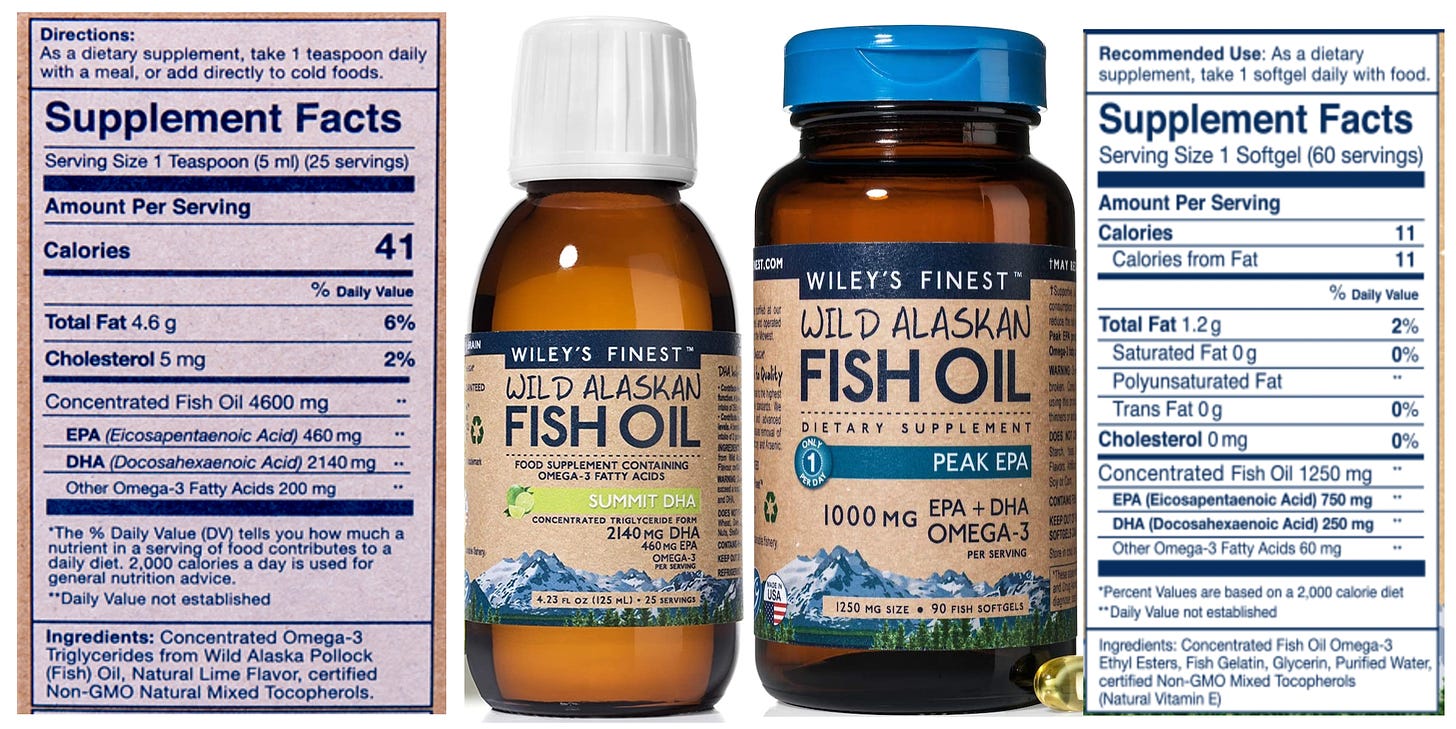
Also, I know many of those reading this don't eat fish. If you aren't convinced by the moral legitimacy of offsetting donations I describe below, you should know that:
- There are plenty of vegan DHA alternatives on the market (like this)
- These are significantly more expensive (~5x or more) per milligram
- For some reason vegan EPA-heavy formulae are hard to find.
- In fact, I can't find a single one (though I haven't) looked that hard.
I go into more detail (including on the physiology of vegan Omega-3s) a few paragraphs down in the "Bonus Content" section below.
Moral indulgences for sale
I generally try to write things that (if anything) make farmed animals’ lives better rather than worse. This time I’m shaking things up by recommending products whose manufacture and purchase likely cause the intense suffering of fish. That’s the bad news.
The good news is that moral offsetting[7] is a (legit, IMO) thing, so you can have your fish and eat them too by donating to the Fish Welfare Initiative (explicitly in need of funding as of publication) and/or Humane Slaughter Association.[8] Details and more information at this^[9] lengthy footnote.
Back to the products
You may be familiar with Omega-3 fatty acids, commonly sold in supplement form as fish oil. I think you should at least consider supplementation if you're
- Not eating a paleo-ish diet that includes fatty fish; and
- Willing to spend a bit of money and effort to improve mood, productivity, or cognition
Over the last decade or so, it’s become clear that the two main subtypes of Omega-3, eicosapentaenoic acid (EPA) and docosahexaenoic acid (DHA), definitely do different things at the cellular level and maybe have different effects on cognition and mental health.
Although billions of dollars of fish oil supplements are sold each year, it seems that only a small handful of studies and a slightly larger handful of random very online nerds (mostly on r/nootropics) actually try to compare the differential physiological and subjective effects of DHA and EPA supplementation.
Well, I’m one of those nerds, and my hyperanecdotal impression is that they do indeed “feel” somewhat different upon ingestion. So, if you’re going to try supplementing Omega-3s, I think it makes a lot of sense to try DHA-dominant and EPA-dominant formulae separately so as to see which, if either, you prefer.
Read the next section for a bit more comparative info, but the summary is this: there’s good evidence that EPA is better than at improving mood and some evidence that DHA is better at improving cognition, and may even acutely worsen mood.
Read on, nerds
Diving into this could be a whole post on its own, but my basic understanding of the situation is this:
- EPA and high-EPA fish oil
- Reduces inflammation at the cellular level
- Has a robust an antidepressant effect
- Probably mainly affects the brain indirectly by mediating inflammation
- Seems less pro-cognitive than DHA—at least for those without high baseline levels of cellular inflammation—though I’m far from certain about this
- DHA and high-DHA fish oil
- Major physical component of nervous tissue
- Does not have an antidepressant effect
- Low levels may worsen cognition, and supplementation may improve at least some types of cognition (see here)
- More directly affects the brain through a number of different mechanisms outlined here
- Might acutely induce depressive symptoms by elevating levels of acetylcholine in the brain. As far as I can tell, this is just Reddit folk wisdom rather than Real Science
Bonus content for the EA forum!
EA might be the single community with the highest concentration of vegan/vegetarians that care a ton about cognition and productivity. So...
- If you’re vegan (or almost vegan) you really need to supplement both EPA and DHA, but especially the latter.
- I know that plants like flaxseed and hemp contain technically contain Omega 3 in the form of α-Linolenic acid (ALA) but I'm here to tell you that the vegan-hostile health gurus happen to be right this time;
- Unless you are subsisting entirely on flaxseed oil, the tiny ALA→DHA conversion rate isn’t going to cut it.
- There are plenty of vegan Omega 3 supplements on the market, but my guess is that it makes more sense to buy fish oil (which is around 1/5 the cost per mg) and donate some portion of the savings to an org like FWI.
- Don’t be fooled by the price of a bottle; the cost difference is often obscured by the the very small doses per “serving” in vegan supplements.
- For instance, this vegan brand and the DHA brand mentioned above have a similar price per serving, but the latter contains more than six times the amount of Omega-3s in each dose.
- I know that plants like flaxseed and hemp contain technically contain Omega 3 in the form of α-Linolenic acid (ALA) but I'm here to tell you that the vegan-hostile health gurus happen to be right this time;
Last thing…

Please do your due diligence before buying any of these products, especially those you’re meant to ingest. I’m just some guy!
Trust me on the corn bulbs, though.
- ^
In fact, a modified version did appear on my blog for a couple days. I think this is a significant enough improvement that I took the other one down.
Maybe if the crypto market heats back up and I become famous or something I'll sell the original as an NFT (for charity of course).
- ^
He’s also to blame for this post taking so long to appear.
- ^
8TB = 8,000GB = 64 quadrillion binary digits = enough to encode the genetic information of at least 2000 people, which is probably enough to get an mRNA-emulation engine to create enough human embryos to reach the human minimal viable population genetic drift threshold.
- ^
Don’t worry, I wrote them a polite but firmly worded note in the feedback survey. Also, if you’re an IA employee, send me a lifetime supply of DC<>Reykjavik business class flights and we’ll call it even.
- ^
If you’re interested, my microeconometrics textbook was called “Causal Inference: the Mixtape” and it’s free online.
- ^
L-methylfolate is the bioactive form of folate/folic acid that bypasses the MTHFR enzyme, which may or may not be dysfunctional in a sizable share of the population.
- ^
I know people reading the forum probably don't need this footnote, but I'll include it anyway:
See these good resources and this classic. From the first link:
Moral offsetting (sometimes called ethical offsetting) is the practice of undoing wrongs caused in one area by donating to charities working in those areas or engaging in other relevant acts of altruism.
- ^
What does the HSA have to do with the products I recommend?
Arguably, a key moral harm associated buying wild-caught fish (oil) is the 0.5-4 hours it takes for fish to slowly, painfully die of asphyxiation or being gutted alive. There is a totally painless way to kill fish (that apparently makes it taste better too) but it is virtually never used because it requires a bit more time and effort :(
Bonus for the Forum!
On this note: a half-baked idea I have and would endorse is a company that either farms fish in a humane way or catches them wild and then kills them using this method. I think there would be market for this if it was available and marketed, as evidenced by not-totally-bullshit “humane” meat available at Whole Foods.
- ^
Edit, 12:15 am EST June 2: You guys already hit my $1k commitment, so thanks🐟! I need to think a little more about how much more I'm willing to commit to matching. Will update this again, but feel free to email me if I'm taking too long.
Footnote that used to be part of the main text
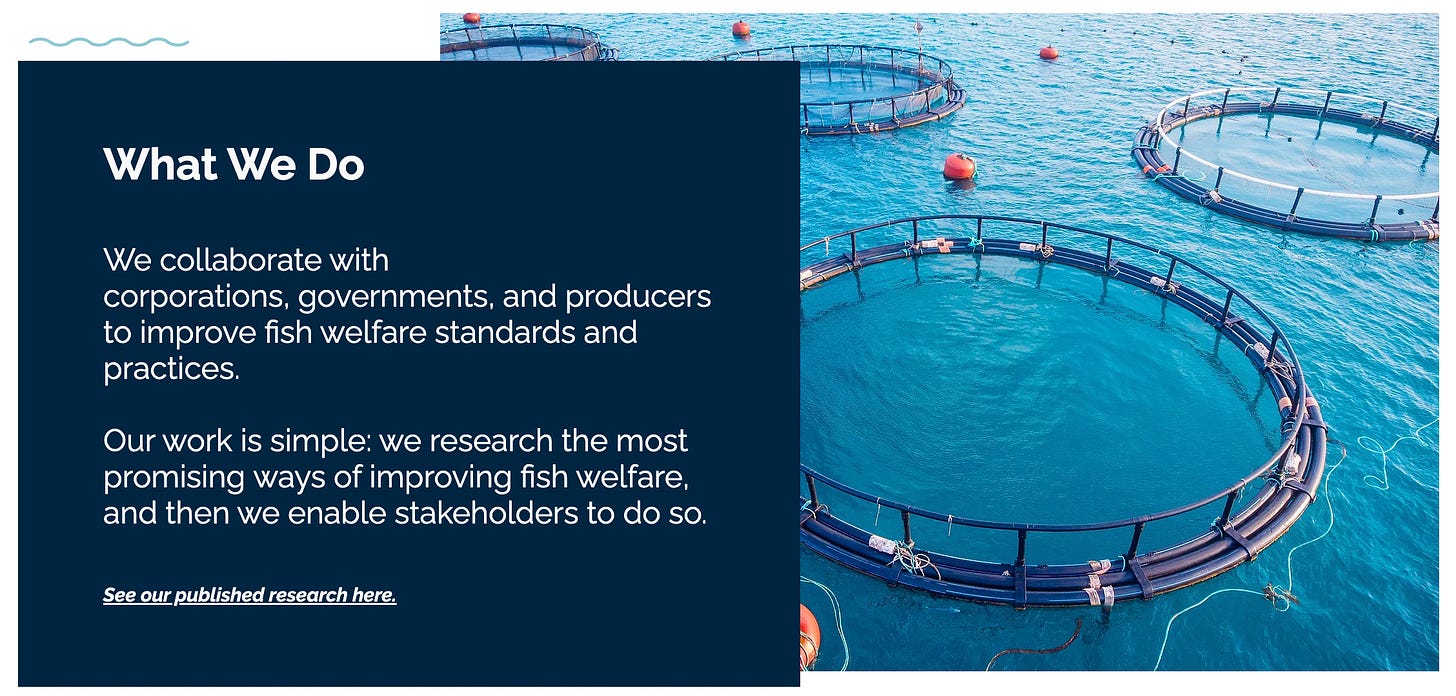

If you’re rich: if you fill that $250k funding gap, I’ll gladly write ~∞ blog posts on any topic you choose (as long they don’t threaten my livelihood or physical safety) To partially assuage my own conscience, I recently donated $100 to each of these organizations. But, on top of this, I’ll match all donations to either of these organizations by anyone reading this up to at least $1,000 of my own giving.
The first round of this matching extravaganza, spawned by my recent 15 minutes of niche Twitter micro-fame, generated to few hundred dollars already, but goddamnit, people, make me part with my own money!
Matching campaign details and fine print
Proof of my donations here and here.
Details (should be a list but the editor keeps crashing)
* If I hit the point at which I’m no longer matching donations, I’ll update this footnote
* And I’ll probably be willing to do more than $1k of my own money. Probably not $5k though.
* Feel free to email me (aaronb50@gmail.com) to check whether I’ll match your donation if it’s more than like $500
* To get the donation matched, you have to actually email me or else I’m not gonna know. Just send a screenshot or a receipt or whatever.
* If you don’t have much money now but think you will in the future, I might be willing to lend you donation money at 0% interest. Email me to work something out.

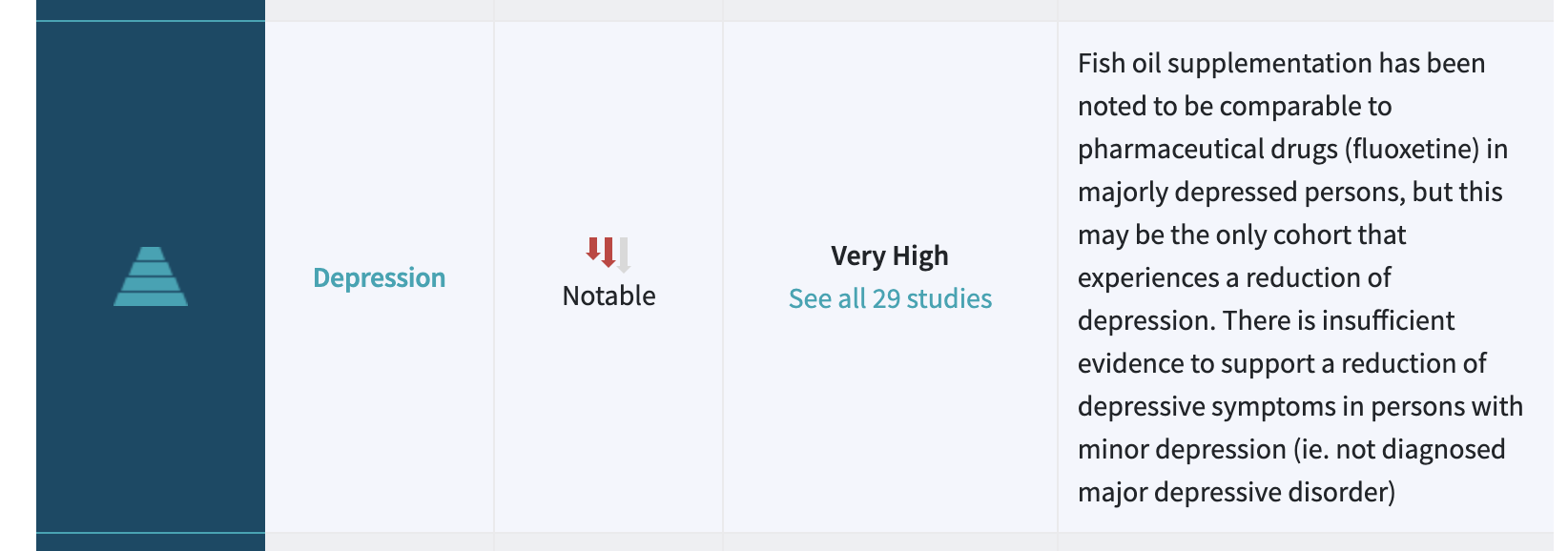
Great post thanks so much!! I really appreciate the concern for animals and learned a few things about some supplements I may want to consider taking while on a plant based diet(been forgetting to take my b12 and eat cruciferous veggies owa)
On your recommendation for Choline though, it's an essential nutrient, but I think consuming too much of it can be harmful for health: https://nutritionfacts.org/topics/choline/
"Our gut bacteria can turn choline into the toxic byproduct and cardiotoxicant TMAO—trimethylamine oxide—which is then absorbed back into our system within only an hour of consumption. The more eggs we eat, the higher the choline and TMAO levels we have, and the higher the risk we may have for heart disease and other diseases. Choline, as well as carnitine in red meat, can be turned into TMAO, which is associated with inflammation and a significantly higher risk of heart disease, heart attack, stroke, or death within a three-year period."
I'd be pretty sceptical of nutrition facts - Dr Greger is seriously biased and relies on very weak evidence for many of his claims.
That said, this paper showed increased TMAO from supplemental choline (but not eggs) though I can't get the full thing to see if the increase was of any clinical relevance:
https://www.sciencedirect.com/science/article/abs/pii/S0002934321002291